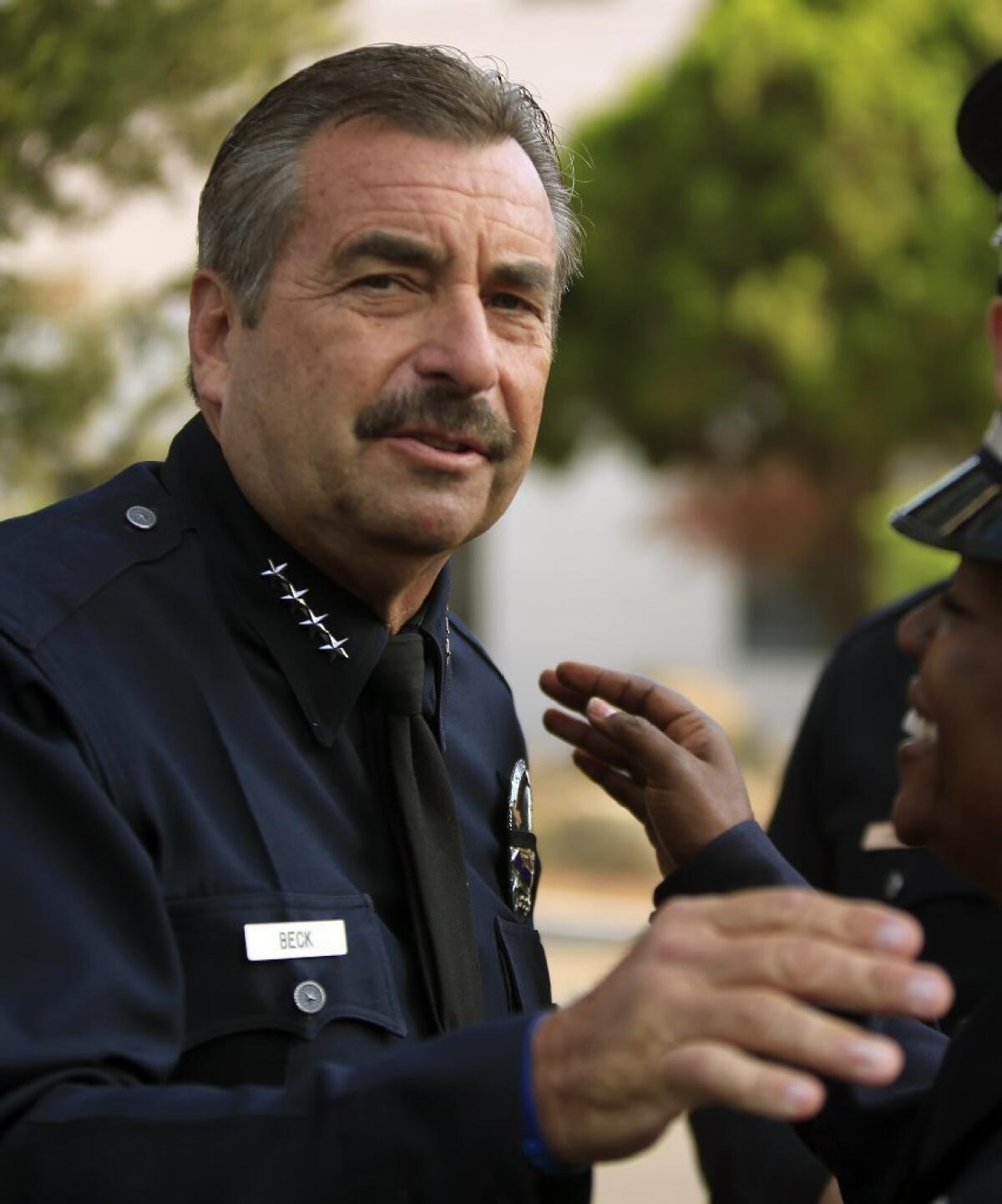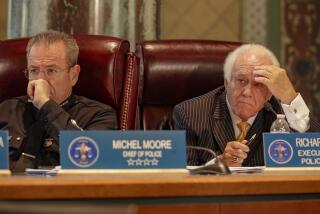Following court defeat, Beck rescinds automobile impound policy

- Share via
Los Angeles Police Chief Charlie Beck on Friday evening quietly rescinded the department’s car impound policy, a controversial set of rules Beck put in place last year to be more lenient on immigrants in the country illegally, but which had come under fire from his own officers and a judge who found the policy violated state law.
The surprise move marked a stark reversal for Beck, who just days earlier had reiterated in an interview with the Los Angeles Times his belief that the impound rules -- called Special Order 7 -- were legal and necessary.
Beck had also reaffirmed the city’s plan to appeal a recent ruling by Los Angeles County Superior Court Judge Terry Green, who struck down the impound rules in a lawsuit brought by the union that represents rank-and-file LAPD officers. Green concluded that Beck’s order improperly attempted to supersede state laws regarding impounds.
Until Friday, observers had widely assumed that lawyers for the city would ask a state appeals court to set aside Green’s decision in an effort to keep the LAPD impound policy in place during the appeal process, which typically takes several months. Now it is unclear whether Beck and city officials still plan to appeal. Beck could not be reached immediately for comment.
A group of immigrant advocacy groups and civil rights organizations that joined the LAPD in defending the legality of Special Order 7 is expected to continue with the appeal, with or without the city’s assistance.
Under the terms of Special Order 7, if police stopped an unlicensed driver who met several requirements -- including having auto insurance, valid identification and no previous citations for unlicensed driving -- officers could no longer invoke the part of the state vehicle code that allowed them to confiscate the vehicle for 30 days, a punishment that came with fines and charges often exceeding $1,200.
In a city with an estimated 400,000 immigrants who are in the country illegally and forbidden by state law from obtaining driver’s licenses, Beck and the LAPD’s civilian oversight board, which approved the policy, argued that Special Order 7 was needed for moral and practical reasons. The 30-day holds, they said, unfairly burdened such drivers, who often are poor and feel they have no choice but risk having their cars seized to drive to work or take their children to school. Beck said he expected that the policy would encourage unlicensed drivers to take steps such as buying insurance to avoid the monthlong holds.
“It’s not so much that I am a dove on immigration,” Beck said in an earlier interview with The Times. “It’s that I’m a realist. I recognize that this is the population that I police. If I can take steps -- legal steps -- to make them a better population to police, then I will.”
The Police Protective League and Judicial Watch, a conservative-leaning watchdog organization based in Washington, sued, arguing that the policy improperly attempted to supersede the state’s impound laws that gave some discretion to officers on whether to use the 30-day hold on a car or not.
Tyler Izen, president of the police union, said in an interview, “I always believed that what the chief was doing was not the solution to a problem that I agree needs to be addressed.”
“Letting people drive without driver’s licenses is reckless, and that’s what he was trying to allow,” Izen said.
Emphasizing that the union has not taken an official position on a bill passed this month by the state Legislature that would allow immigrants in the country illegally to receive licenses, Izen said, “we’ve made the decision that healthcare and education are humanitarian issues. We should make the decision whether a driver’s license ... is a humanitarian issue as well.”
Beck issued a new directive Friday to replace the now-defunct impound rules. “The purpose of this Notice is to provide guidance to officers when making a vehicle impound/removal decision concerning drivers without a valid license,” he wrote on the department’s internal computer network. In perhaps what was an indication that the city still plans to appeal Green’s ruling, Beck added that officers should not adhere to Special Order 7 “until further notice.”
The switch from the order returns to officers some level of authority when deciding on impounds, but instructs them to take a common sense approach spelled out in a legal principle called the Community Caretaking Doctrine. They should, Beck wrote, “take into account the ‘totality of the circumstances’ to determine whether an impound/removal is appropriate.”
For example, Beck instructed, an impound is acceptable if there is no other way to prevent “the immediate and continued unlawful operation” of a car. However, according to the Caretaking Doctrine, if someone else in the car has a license or the unlicensed driver is already at his residence when he is pulled over, then the officer should not impound the car, Beck said.
Beck also tried to clarify for officers the multiple sections of the state vehicle code that authorize officers to use the 30-day hold in some cases and a less severe impound in others, under which a driver can retrieve his car immediately. Beck has said in the past that the various sections of the code are confusing and leave unlicensed drivers at the mercy of individual officers, some of whom may take a more lenient approach than others.
“Officers should determine which statutory authority is most appropriate for the given circumstance,” Beck wrote.
ALSO:
Judge won’t reconsider car impound ruling
LAPD officers find car impound policy confusing
Los Angeles police union sues over impound policy
Twitter: @joelrubin
More to Read
Sign up for Essential California
The most important California stories and recommendations in your inbox every morning.
You may occasionally receive promotional content from the Los Angeles Times.











